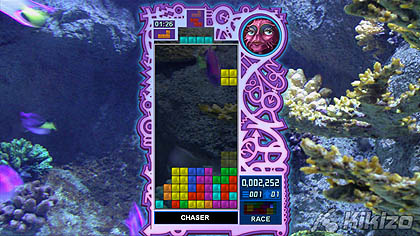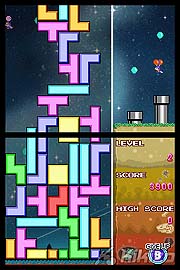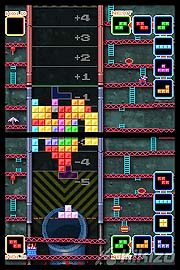Interview: Tetris - The Making of an Icon
We interview two game prodigies, Alexey Pajitnov & Henk Rogers, whose fascinating story behind Tetris goes right to the top of NCL - with plenty of twists along the way.
Page 3
Kikizo: OK. We'll stop that part there, then. You did keep one great friend through it, right? Henk Rogers.
 Pajitnov: Exactly, yes. He came to Moscow in 1988, I believe, looking for the rights for handhelds, for Game Boy. He honestly thought he had the rest of the rights for it, for Japan at least. He published games for Japanese computers, and he did publish them for Nintendo, on the Famicom, which was kind of disputable license wise.
Pajitnov: Exactly, yes. He came to Moscow in 1988, I believe, looking for the rights for handhelds, for Game Boy. He honestly thought he had the rest of the rights for it, for Japan at least. He published games for Japanese computers, and he did publish them for Nintendo, on the Famicom, which was kind of disputable license wise.
Kikizo: Because there was Tengen as well.
Pajitnov: Yeah, Tengen thought they had the rights as well because it was supposedly sub-licensed to them. Henk published his version in Japan. But that deal was a different story license wise as well. But he came to Moscow just to buy the handheld rights.
Kikizo: And, of course, it proved to be a really, really great synergy for Nintendo and Tetris.
Pajitnov: Yeah, Tetris was a pretty liked game because of the Game Boy. Those two were kind of born for each other.
Kikizo: Yeah, that's what I was thinking as well. The Game Boy would have never been that popular without Tetris, and Tetris would have never been that popular without.
Pajitnov: Yes, that is absolutely true. It's like they were made for each other.
Kikizo: So that's a three-way relationship that still exists today. Nintendo, you and Henk.
Pajitnov: Yes, we still try to keep together.
Kikizo: What is your involvement these days with the Tetris Company? Henk is the president of the company, right?
Pajitnov: Yeah, I'm one of the founders of the Tetris Company and I am an adviser. We have the quality control meetings for the games. I do not work on the games directly but because we want to keep the game pure we have these meetings to discuss the upcoming Tetris games. We don't want to give it too much diversity, because we want to keep the title straight, you know? So we look at the new versions and give the approval and try to keep the standards all Tetris games have to keep.
Kikizo: Did your life change in any big way after '88, when you were still in Russia?
Pajitnov: Oh yes, of course. First of all, I decided I wanted to be a game designer, and so I became a game designer. Eventually I quit my job at the computer centre and became a freelance in Moscow and designed games for different companies. Later on I moved to the United States, in '91, and founded a new company called AnimaTek and tried to keep it and published several games there. Later on, I joined Microsoft in '96, and I did work for seven years at Microsoft as a game designer, and I published several games there. And now I'm freelance again. That's my story.
Kikizo: Could we talk a little bit about AnimaTek?
Pajitnov: At AnimaTek we developed a kind of interesting software called El-Fish. It wasn't a pure game, but it was kind of very strange software, in between everything. It was partially a game, partially a sort of scientific system for artificial selection. Partly it was kind of a 3D screen saver. So it was quite a bit of everything. And it wasn't very successful, because it kind of appeals to human creativity, but there aren't too many creative people around, you know? It was a little bit early for its time because it needed a higher-end PC. And creatively there wasn't really anything on the market like it at the time.
Kikizo: I'm wondering, do you know Yoot Saito?
Pajitnov: Yoot Saito? Who's that? A designer?
Kikizo: Yeah, a Japanese game designer. Apparently El-Fish was one of his influences in designing Seaman for the Sega Dreamcast.
Pajitnov: I see. Well, El-Fish was done very well - at least it was an experiment many appreciated very much. Later on we did another game called Ice and Fire that failed. It was a 3D shooter, and everyone forgot about it. Me personally, I didn't like this game but still, it was a part of our history. And later on AnimaTek started working more on technology and made several graphical software systems. But I wasn't very interested in working with technology alone. I just wanted to make games. So I left the company and went to Microsoft.
Kikizo: What year was that?
Pajitnov: '95 or '96 I joined Microsoft.
Kikizo: So, while you were working at Microsoft, you still had a game for the N64?
Pajitnov: Ah, yes, we did Tetrisphere, but that was a kind of contract work, and I kind of continued at my master job. That's why I kept looking around and I could do contract work.
Kikizo: So Microsoft had no problem with you working for Nintendo?
Pajitnov: I think Microsoft hired me after I was done with that Nintendo work. It was just contract work though. It wasn't that they prohibited me from doing work for others.
Kikizo: So from Microsoft then you worked on Night Moves, Clockworks, Microsoft Entertainment Pack...
Pajitnov: ...No, no. Clockworks and Breakthru - those games were not my games. I didn't make those but they were brought to the market by Spectrum Holobyte. They wanted my name on there saying Alexey Pajitnov Presents. Night Moves however was my game. I designed it and Spectrum Holobyte published it. I think this was in '92 or '93. Then I started working on Microsoft Puzzle Collection. Not all the games on there were mine but four of them were. Then I did a game called Mind Aerobics. After that I made a game called Pandora's Box. Later on I got involved in several projects at Microsoft, as a simple level design or whatever. But later on I joined the Arcade (Online games) team, which was a large unit that did several games for them, including Hexic.








 Satoru Iwata Video Interview - the late Nintendo president spoke with Kikizo in 2004 as 'Nintendo Revolution' loomed.
Satoru Iwata Video Interview - the late Nintendo president spoke with Kikizo in 2004 as 'Nintendo Revolution' loomed. Kaz Hirai Video Interview - the first of Kikizo's interviews with the man who went on to become global head of Sony.
Kaz Hirai Video Interview - the first of Kikizo's interviews with the man who went on to become global head of Sony. Ed Fries Video Interview - one of Xbox's founders discusses an epic journey from Excel to Xbox.
Ed Fries Video Interview - one of Xbox's founders discusses an epic journey from Excel to Xbox. Yu Suzuki, the Kikizo Interview - we spend time with one of gaming's most revered creators.
Yu Suzuki, the Kikizo Interview - we spend time with one of gaming's most revered creators. Tetris - The Making of an Icon: Alexey Pajitnov and Henk Rogers reveal the fascinating story behind Tetris
Tetris - The Making of an Icon: Alexey Pajitnov and Henk Rogers reveal the fascinating story behind Tetris Rare founders, Chris and Tim Stamper - their only interview? Genuinely 'rare' sit down with founders of the legendary studio.
Rare founders, Chris and Tim Stamper - their only interview? Genuinely 'rare' sit down with founders of the legendary studio. The History of First-Person Shooters - a retrospective, from Maze War to Modern Warfare
The History of First-Person Shooters - a retrospective, from Maze War to Modern Warfare